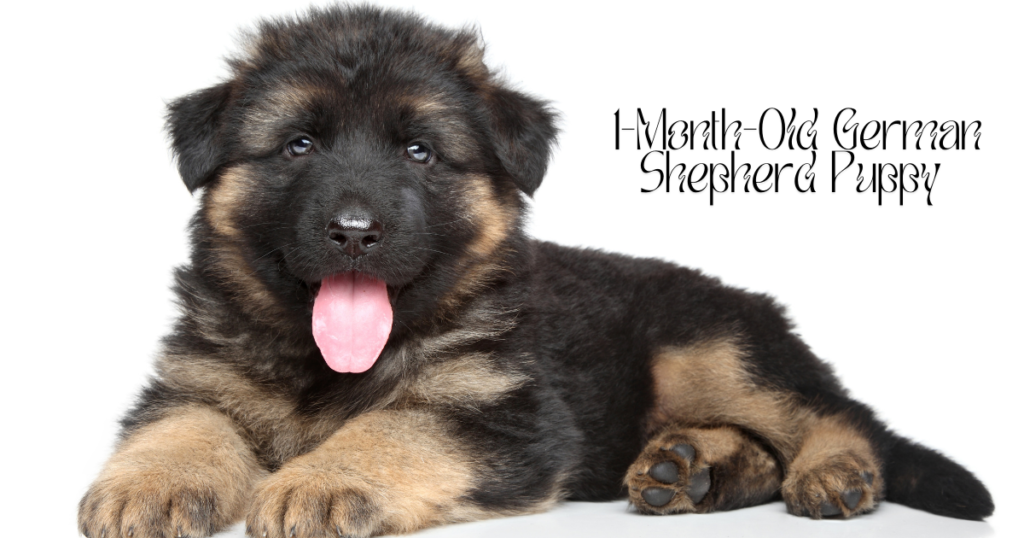Welcoming a German Shepherd dog into your private home is an thrilling and profitable experience. At just one month old, your German Shepherd domestic dog is at an essential stage in his development.
This article will stroll you through the guidelines and recommendation you need to make sure your puppy grows into a healthful, properly-adjusted adult.
Understanding Your 1-Month-Old German Shepherd
At one month antique, German Shepherd puppies are simply starting to explore the sector round them. They are especially dependent on their mom and are starting to transition from a milk-only food regimen to stable meals. This is a critical time for his or her bodily and emotional improvement.
Physical Development
- Size and Weight: A one-month-antique German Shepherd puppy commonly weighs among five to ten pounds. They are small but growing unexpectedly.
- Teething: Your domestic dog may also begin teething around this age, leading to a few soreness. Chew toys can help soothe their gums.
- Motor Skills: At this degree, your pup will begin to stroll and discover their surroundings, although they’ll still be a piece wobbly.
Emotional Development
- Socialization: Puppies at this age are fantastically impressionable. Early socialization is crucial to assist them develop into confident and nicely-behaved adults.
- Bonding: Establish a sturdy bond along with your pup through gentle dealing with and effective interactions. This will construct believe and make schooling less difficult in a while.
Feeding Your 1-Month-Old German Shepherd
Nutrition
- Diet Transition: By one month, your puppy should be gradually transitioning from their mother’s milk to a awesome doggy food. Choose a emblem mainly formulated for massive breed dogs.
- Feeding Schedule: Feed your doggy small food three to 4 instances a day. Follow the guidelines on the puppy food package deal for portion sizes, and adjust as needed primarily based to your domestic dog’s boom and interest stage.
Hydration
- Water: Ensure your puppy has access to sparkling water at all times. Proper hydration is essential for their general fitness and development.
Health and Veterinary Care
Vaccinations and Worming
- Veterinary Check-Up: Schedule a vet visit for a health test-up and to speak about vaccination and deworming schedules. Your vet will guide you on the proper vaccinations and remedies to your pup’s age.
Parasite Prevention
- Flea and Tick Prevention: While now not usually vital at this young age, talk flea and tick prevention together with your vet to establish a plan for later.
Training and Socialization
Basic Training
- House Training: Begin introducing your doggy to basic house training ideas. Take them outside regularly to encourage them to alleviate themselves in the proper location.
- Basic Commands: Start coaching easy commands like “take a seat” and “live.” Use advantageous reinforcement strategies, consisting of treats and praise, to inspire your puppy.
Socialization
- Exposure to New Experiences: Safely reveal your pup to diverse environments, sounds, and people. This enables them build confidence and reduces the danger of behavioral troubles later on.
Creating a Safe Environment
Puppy-Proofing Your Home
- Safety: Puppy-proof your own home by means of removing capability risks together with electric cords, small gadgets, and toxic vegetation. Ensure that your puppy’s surroundings is secure and stable to prevent injuries.
Sleeping Arrangements
- Comfortable Space: Provide a relaxed, exact napping area in your domestic dog. A soft mattress in a quiet place of the house will help them feel secure and comfortable.
1-Month-Old German Shepherd Puppy types
Category |
Details |
|---|---|
| Age | 1 month (4 weeks) |
| Size | Small, typically around 5-10 pounds (2.3-4.5 kg) |
| Height | About 6-8 inches (15-20 cm) at the shoulder |
| Weight | 5-10 pounds (2.3-4.5 kg) |
| Diet | Mainly nursing from mother or formula; beginning to explore solid food |
| Teething | Baby teeth are starting to come in |
| Socialization | Developing basic social skills; important to expose to different people and environments |
| Training | Basic commands like “sit” and “come” can be introduced gently |
| Health Care | Vaccinations typically start around 6-8 weeks; regular vet check-ups are essential |
| Grooming | Minimal, but should be handled regularly to get used to grooming |
| Exercise | Short play sessions; puppies need a lot of sleep |
| Behavior | Curious, playful, and starting to develop individual personality traits |
| Sleep | Sleeps a lot, usually around 18-20 hours a day |



You Are Responsible For A Top British Pornstars Budget?
12 Top Ways To Spend Your Money best british pornstars (https://grizzle-Fish-h8fn99.mystrikingly.com/)